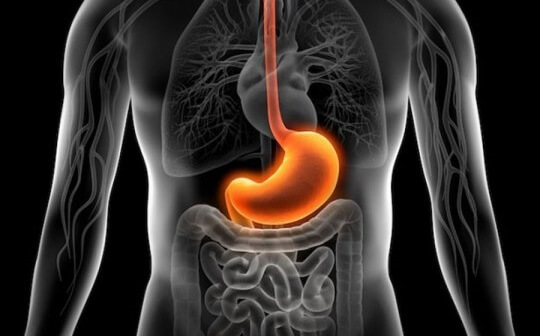Stress and Gastritis: How are They Related?

Stress and gastritis are two words that often go hand-in-hand. The digestive system really feels your emotions. Each person experiences stress differently, but it always affects us in some way.
When we have stress and gastritis it’s important to seek medical help. The problem is that many people don’t even notice it. The symptoms aren’t always obvious when you’re stressed. Sometimes, you just feel vaguely upset. However, when you’re stressed all the time, you start to feel it in your stomach.
The body and mind do not work separately. What happens in one part affects the other. Our digestive system captures and projects the relationship between our inner and outer world.
“Dig the well before you are thirsty”.
-Chinese proverb-
Stress and gastritis: symptoms
Gastritis is a constant, throbbing pain felt in the upper part of the stomach. It’s usually produced by a bacteria altering the intestinal flora, which hinders digestion.
There is a type of gastritis caused by anxiety or stress. If there is stress and gastritis at the same time, there will be some signs. It is important to be alert so that you can act on time if you see symptoms. Delay could cause even more problems to develop.

Among the main symptoms of stress and gastritis we find:
- Heartburn. This is when stomach acid rises from the stomach to the esophagus. It is one of the first symptoms that indicates stress and gastritis.
- Stomachaches. In other words, frequent pain in the stomach. It may increase in frequency and intensity.
- Swelling and nausea. The stomach gets inflamed, making it look like a “drum”. That is, it feels warm and taut. Sometimes there is also vomiting.
- Pain in the neck and shoulders. These are signs that you are very stressed. Muscles here become tense, and occasionally there is pain.
- Skin problems and hair loss are also signs that there is a lot of stress. Very rarely there is acne, but also there may be rashes or other problems.
- Sadness and nervousness. These are symptoms of both stress and gastritis. The person’s mood is no longer the same. They feel despondent and distressed for no reason.
- Sleep problems and irritability. Like with sadness and nervousness, these occur when there is stress and gastritis, or one of the two.
It is common for eating disorders to also develop. The person may eat too much or stop eating. In both cases, the stomach becomes the person’s focus, so much so that it may turn into a true eating disorder.
Nervous gastritis
When there is stress and gastritis at the same time, this is “nervous gastritis”. Either way, this should always be diagnosed by a doctor. It is not a good idea to jump to conclusions. If you are careful with your diet and you still have stomach discomfort, it is time to consult a health professional.

The treatment of nervous gastritis is similar to treatment for other types of gastritis. The difference is that there is also a psychological component. From the physical point of view, the best thing to do is to eat a healthy diet. Also, you should get enough rest, which means at least seven hours of sleep a day. Eat low-fat foods, as well as fruits and vegetables, and drink plenty of fluids.
From the emotional point of view, it’s a good idea to go to therapy before anything else. That way you can identify the true cause. Sometimes it is simply a one-time problem that you haven’t identified yet. But other times the issue goes deeper and you can work on it with good, regular therapy.
We highly recommend exercising and using relaxation techniques. These steps help both physically and emotionally. They help regulate digestion and relax muscles, as well as oxygenate the brain and help us find mental balance.
The important thing is that these measures be taken on time. When you wait too long, a relatively simple health problem can become chronic and trigger all kinds of complications.
Stress and gastritis are two words that often go hand-in-hand. The digestive system really feels your emotions. Each person experiences stress differently, but it always affects us in some way.
When we have stress and gastritis it’s important to seek medical help. The problem is that many people don’t even notice it. The symptoms aren’t always obvious when you’re stressed. Sometimes, you just feel vaguely upset. However, when you’re stressed all the time, you start to feel it in your stomach.
The body and mind do not work separately. What happens in one part affects the other. Our digestive system captures and projects the relationship between our inner and outer world.
“Dig the well before you are thirsty”.
-Chinese proverb-
Stress and gastritis: symptoms
Gastritis is a constant, throbbing pain felt in the upper part of the stomach. It’s usually produced by a bacteria altering the intestinal flora, which hinders digestion.
There is a type of gastritis caused by anxiety or stress. If there is stress and gastritis at the same time, there will be some signs. It is important to be alert so that you can act on time if you see symptoms. Delay could cause even more problems to develop.

Among the main symptoms of stress and gastritis we find:
- Heartburn. This is when stomach acid rises from the stomach to the esophagus. It is one of the first symptoms that indicates stress and gastritis.
- Stomachaches. In other words, frequent pain in the stomach. It may increase in frequency and intensity.
- Swelling and nausea. The stomach gets inflamed, making it look like a “drum”. That is, it feels warm and taut. Sometimes there is also vomiting.
- Pain in the neck and shoulders. These are signs that you are very stressed. Muscles here become tense, and occasionally there is pain.
- Skin problems and hair loss are also signs that there is a lot of stress. Very rarely there is acne, but also there may be rashes or other problems.
- Sadness and nervousness. These are symptoms of both stress and gastritis. The person’s mood is no longer the same. They feel despondent and distressed for no reason.
- Sleep problems and irritability. Like with sadness and nervousness, these occur when there is stress and gastritis, or one of the two.
It is common for eating disorders to also develop. The person may eat too much or stop eating. In both cases, the stomach becomes the person’s focus, so much so that it may turn into a true eating disorder.
Nervous gastritis
When there is stress and gastritis at the same time, this is “nervous gastritis”. Either way, this should always be diagnosed by a doctor. It is not a good idea to jump to conclusions. If you are careful with your diet and you still have stomach discomfort, it is time to consult a health professional.

The treatment of nervous gastritis is similar to treatment for other types of gastritis. The difference is that there is also a psychological component. From the physical point of view, the best thing to do is to eat a healthy diet. Also, you should get enough rest, which means at least seven hours of sleep a day. Eat low-fat foods, as well as fruits and vegetables, and drink plenty of fluids.
From the emotional point of view, it’s a good idea to go to therapy before anything else. That way you can identify the true cause. Sometimes it is simply a one-time problem that you haven’t identified yet. But other times the issue goes deeper and you can work on it with good, regular therapy.
We highly recommend exercising and using relaxation techniques. These steps help both physically and emotionally. They help regulate digestion and relax muscles, as well as oxygenate the brain and help us find mental balance.
The important thing is that these measures be taken on time. When you wait too long, a relatively simple health problem can become chronic and trigger all kinds of complications.
This text is provided for informational purposes only and does not replace consultation with a professional. If in doubt, consult your specialist.







